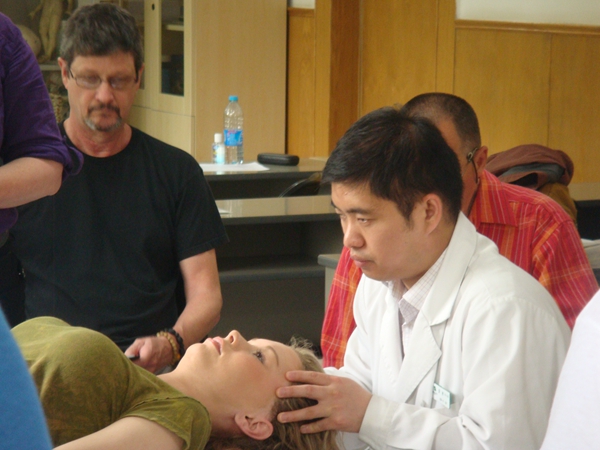Blind masseur shows the benefits of TCM


As a visually-impaired masseur at Beijing Massage Hospital, 40-year-old Xue Nan has devoted himself to not only relieving patients of pain, but also promoting Traditional Chinese Medicine to foreigners.
Xue suffered visual degradation when he was young, and went to Beijing School for the Blind after he graduated from junior high school to learn massage skills. At that time, some English majors from the Capital Normal University worked as interns at his school. They taught Xue English and sparked his interest in the language.
"I bought some tapes to listen to every day, and insisted on the listening practice from then on," says Xue.
After graduation, he was enrolled in the TCM college of Beijing Union University, where he received education in both TCM and modern clinical medicine.
His continuous efforts to keep on improving his English gave him an opportunity to engage in a project to demonstrate his massage skills in Ireland not long after he started to work as a massage doctor at Beijing Massage Hospital in 2002.
Sponsored by China Disabled Persons' Federation and the Irish Wheelchair Association, the project required him to work in a local hospital and offer massages to local people for seven months.
"People would pay 30 euros ($34) to enjoy a 30-minute massage. They seemed to enjoy it very much, and I would receive eight to 10 people every day," says Xue.
Xue says the experience helped him to learn a lot, especially in English. After he came back, he felt he "began to be qualified to do work related to foreign exchanges". He then worked as an interpreter when foreign guests visited the hospital.
Since Beijing Massage Hospital began providing training for foreign students, he has worked as a teacher in his spare time to spread knowledge about TCM, including massage skills in 2004.
Xue still remembers the first group of students he taught. "They were three Italian students, and I taught them at night. Although we didn't have high-tech tools like PowerPoint and I was inexperienced at that time, I prepared my lessons very carefully."
Over the years, Xue has gained more and more experience, and explored a distinctive way to spread theories in TCM, which are related to Chinese philosophy and are difficult to explain to foreigners.
"I introduce TCM in vivid Chinese stories, and supplement and prove the TCM theories with theories of modern medicine," says Xue.
For example, to clarify the TCM theory of "rapture harms heart", Xue told the story of Fan Jin, a character in the ancient Chinese novel The Scholars. Fan was so overjoyed when he successfully passed the provincial civil service examination at age 54 after repeated failures that he became crazy. He was returned to normal after being shocked by his father-in-law.
"From the TCM theory, sudden rapture may lead to damage in the heart, and a sudden shock can relieve the patient from a manic state. From the modern theory, the shock can be seen as a psychological treatment," he says.
Right now, he teaches more than 100 students every year, including medical students, nurses, midwives and those who want to learn massage for family members. They come from various countries like the United States, France, Germany and Canada.
In 2015, Xue joined a project in Mauritius to impart massage skills to physical therapists and local blind people, as well as providing massage services to local people.
When the project finished, he received gratitude from many of the blind students who said Xue's teaching has provided them with new working opportunities.
According to Armoogum Parsuramen, founder-president at Global Rainbow Foundation which organized this project, some of the blind people Xue tutored have worked as masseurs, and received recognition from the society as people who can support themselves.
Xue believes spreading the knowledge of TCM is a way of spreading Chinese culture. "For example, when I talk about ancient Chinese medical classics Huangdi Neijing (Inner Canon of the Yellow Emperor), I naturally introduced Huang Di, and ancient Chinese history related to him," says Xue.
"Since people overseas view things from a different angle to Chinese people, I use a lot of comparisons to help them understand Chinese culture, and that is the basis for them to understand TCM."
According to Cui Yongqiang, a doctor at China Academy of Chinese Medical Sciences Guang'anmen Hospital in Beijing who has worked with Xue, "Xue has a grateful heart for society and those who helped him. He is tough enough to conquer many difficulties, and I respect his efforts in promoting TCM culture".
Xue says he sometimes feels tired and stressed, working every day massaging about 30 people, doing work related to foreign exchanges, giving lectures and improving his knowledge, but he has a sense of responsibility to make the effort.
"Since I am trusted to do the work, I cannot let anyone down."




































